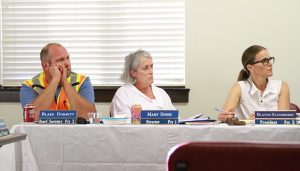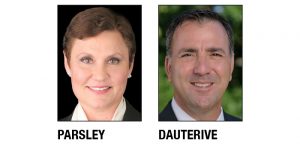By Dale Roberson
When Pedernales Electric Co-op (PEC) members gather for the annual membership meeting in Cedar Park June 21, they will be introduced to a co-op that looks different than in the past.
That’s what new CEO John Hewa and PEC Board President Patrick Cox are hoping.
The change follows a raucous history – as recent as 2007 to 2009, and going back to the 1980s when complaints were filed against the co-operative for its closed-door policies. The state and legislature, as well as the U.S. House of Representatives, got involved in the investigation, and the co-op’s general manager and board president were ousted.
Malfeasance was found, books were audited and many misdeeds were found as those in charge used the co-op’s funds for personal gain.
But that was a long time ago. Since then, a new board has been elected, rules have changed. No longer are board members paid an exorbitant salary for serving; the general manager no longer has carte blanche to spend at will.
It has been a long road, with PEC members following the re-emergence of a more transparent co-operative where members are encouraged to vote, to show up at meetings, to voice opinions.
Part of the change comes with new management, and Hewa, an engineer who took over management of PEC a few months ago, is part of the long line of changes made in the past several years.
In an exclusive interview with the Hays Free Press and News-Dispatch last week, Hewa and Cox outlined recent changes and spoke about how they felt the future of the organization will look.
PEC is a rarity among energy co-ops. Most are “vertical”, according to Hewa. In other words, they own the power source, the transmission methods and every detail. PEC, on the other hand, purchases electric power from the Lower Colorado River Authority (LCRA) and sells it to its members. The co-op owns only the power lines and distribution system.
When Hews joined PEC, he faced a real problem – how to address the growth that this part of Texas is seeing. The co-op is now growing at more than three percent a year. Hays County is growing at a rate of about eight percent annually.
The average size of other electric co-ops is about 20,000, according to Hewa. PEC added more than 8,000 members last year alone.
“That growth means we are adding an average co-op every two-and-one-half years,” Hewa said.
Cox said, “The PEC is the largest electric co-op in the nation.”
It serves more than 250,000 members in 24 counties and maintains more than 17,000 miles of electric lines.
He said PEC is now valued at $1.3 billion.
“Within that [service] area, we have to provide uninterrupted electric power as well as recognize how (upgrades) affect our employees,” Hewa said. “We have to make those employee relations better while [employees] learn to serve our customers more efficiently.”
Recent financial audits for 2013 show that technology upgrades are leading to financial security, both men said. PEC recently received a clean financial audit for 2013 from an independent auditing firm.
Audits in the past, especial six to eight years ago, found mismanagement. Those independent audits led to the dismissal and prosecution of the co-op’s top management. But recent audits have shown a complete turnaround in the way the co-op is run.
And a large part of the most recent turnaround is the computerization of the entire operation, Hewa said.
One example of technology making the co-op more efficient is work tickets, which outline jobs in the queue and the order of priority. Formerly, crew chiefs picked up paper copies and returned them to the branch offices. Now, field crews receive work tickets online. They can report the state of the job and the estimated time, which is then relayed to the customer.
More efficiency also is being accomplished by tracking the 200-plus vehicles PEC has in the field using GPS technology.
By making fieldwork more efficient, PEC’s employees are not only safer but member relations are improving, Cox said.
With technology improvements, Hewa said the co-op does not have to add more employees “per meter count.” The co-op now has 736 employees, down from 900.
Efficiency savings are important to members as costs and savings are spread across the entire membership, Hewa said.
One major complaint from the past was the lack of transparency in the operations of the co-operative. Annual meetings were held at the company’s headquarters in Johnson City – always held during the day – and nominations to the board could not be made from the floor. Instead, a committee appointed by the PEC management made all nominations.
That model is now a distant memory. The annual meeting is Saturday, June 21, in Cedar Park. Voting will be open from 8 a.m. until 10:30 a.m. In addition, co-op members will be mailed ballots May 22 through May 27. So, members can vote online, through a mail ballot, or in person at the meeting.
Cox said PEC is a leader among electric co-ops in terms of governance structure, openness and transparency.
“We are among the first electric co-ops in the nation to have a Member Bill of Rights that guarantees fair and honest elections, open meetings and open records as part of our corporate charter,” he said.
Other transparency measures have also been made, with real outreach to members, Hewa and Cox pointed out.
For example, the citizens of Wimberley last Wednesday held a community meeting where PEC explained an upgrade to the town’s power source.
A transmission line from the station near the junction to downtown will soon optimize the delivery of electricity. PEC is in the process of acquiring right-of-way, has already advised those affected of the process by mail and had engineers on hand to answer members’ questions at the meeting.
PEC received questions not only about the new transmission line, but also on its move to renewable energy sources.
The co-op now buys about 11 percent of its electricity from renewables – mostly wind – with South Trent Wind Farm providing much of that energy.
Another renewable energy source is solar, with PEC investigating the possibilities. Hewa said with solar energy costs dropping sharply over the past two years, the co-op is looking into ways that commercial members can participate in the program.
Hewa said PEC is also exploring a commercial lighting program where institutions or groups install a solar system for larger buildings, such as a school or apartment complex, and spread the savings among their taxpayers or occupants. Unused electric power is returned to the co-op for credit.
Other cost-savings includes the use of LED for all PEC field lights, which lowers maintenance costs and preserves the night skies.
Hewa and Cox both asked that members be sure to vote during the upcoming elections. For District 2 on the board, William (Bill Boggs) is facing off against Emily Pataki; for District 3, four candidates are running – Judy Lawler Pokorny, Kathryn Scanion, Arnold LeVine and Don Summerman. Board members serve three year terms; for this cycle, the winners will serve from 2014-2017.
Also on the ballot is a referendum regarding the co-op’s election system. Currently, board members are voted at-large. The referendum will ask members to decide between at-large voting and single-member district voting.
PEC’s annual meeting
PEC’s annual meeting will be held beginning at 8 a.m. June 12 at the Performing Arts Center in Cedar Park. Members may vote in the election online, by mail or in person at the meeting. Visit www.pec.coop for more information on the ballot referendum and to learn more about the candidates.
Cyndy Slovak-Barton contributed to this story.










